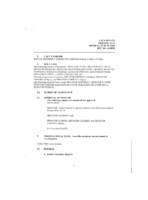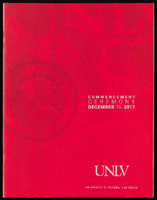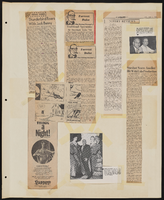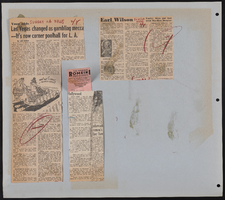Search the Special Collections and Archives Portal
Search Results

Roadrunners Internationale Banquet presentations, October 6, 2005
Date
Archival Collection
Description
Text

Meeting minutes for Consolidated Student Senate, University of Nevada, Las Vegas, June 28, 2004
Date
Archival Collection
Description
Text
Karin Hilgersom (Truckee Meadows Community College) oral history interview conducted by Magdalena Martinez and Elia Del Carmen Solano-Patricio: transcript
Date
Archival Collection
Description
From the Lincy Institute "Perspectives from the COVID-19 Pandemic" Oral History Project (MS-01178) -- Education sector interviews file.
Text

University of Nevada, Las Vegas (UNLV) Fall 2017 commencement program
Date
Archival Collection
Description
Commencement program from University of Nevada, Las Vegas Commencement Programs and Graduation Lists (UA-00115).
Text

Kathia Quiros Pereira oral history interview: transcript
Date
Archival Collection
Description
Oral history interview with Kathia Quiros Pereira conducted by Monserrath Hernández on March 6, 2020 for the Latinx Voices of Southern Nevada Oral History Project. Pereira discusses her personal history and immigration from Lima, Peru to the United States. She also talks of her educational background as a student at the William S. Boyd School of Law at the University of Nevada, Las Vegas and her current work as a founding partner of Pereira Immigration Law Group where she exclusively practices immigration law in Las Vegas.
Text

Erica Mosca oral history interview: transcript
Date
Archival Collection
Description
Oral history interview with Erica Mosca conducted by Cecilia Winchell, Stefani Evans, and Jerwin Tiu on February 3, 2023 for the Reflections: the Las Vegas Asian American and Pacific Islander Oral History Project. In this interview, Mosca reflects on her life journey from a low-income Asian American to a current serving Nevada State Assemblywoman. She recalls that most of her childhood was in Palm Springs, California where she enjoyed a diverse community of students within her education system. It was not until she moved to Navato, California where she first experienced the economic and resource gap between economically diverse areas. Mosca went on to be involved in a college readiness program and received a scholarship to Boston University. After college, Mosca went on to work for Teach for America where she was stationed on the east side of Las Vegas at Goldfarb Elementary School where she grew a passion for leadership. She eventually returned to school and graduated from Harvard University, returning to Las Vegas to start her nonprofit "Leaders in Training." Mosca hopes to inspire change in her communities by enacting legislation and initiatives targeted towards the communities she was and continutes to be a part of.
Text




